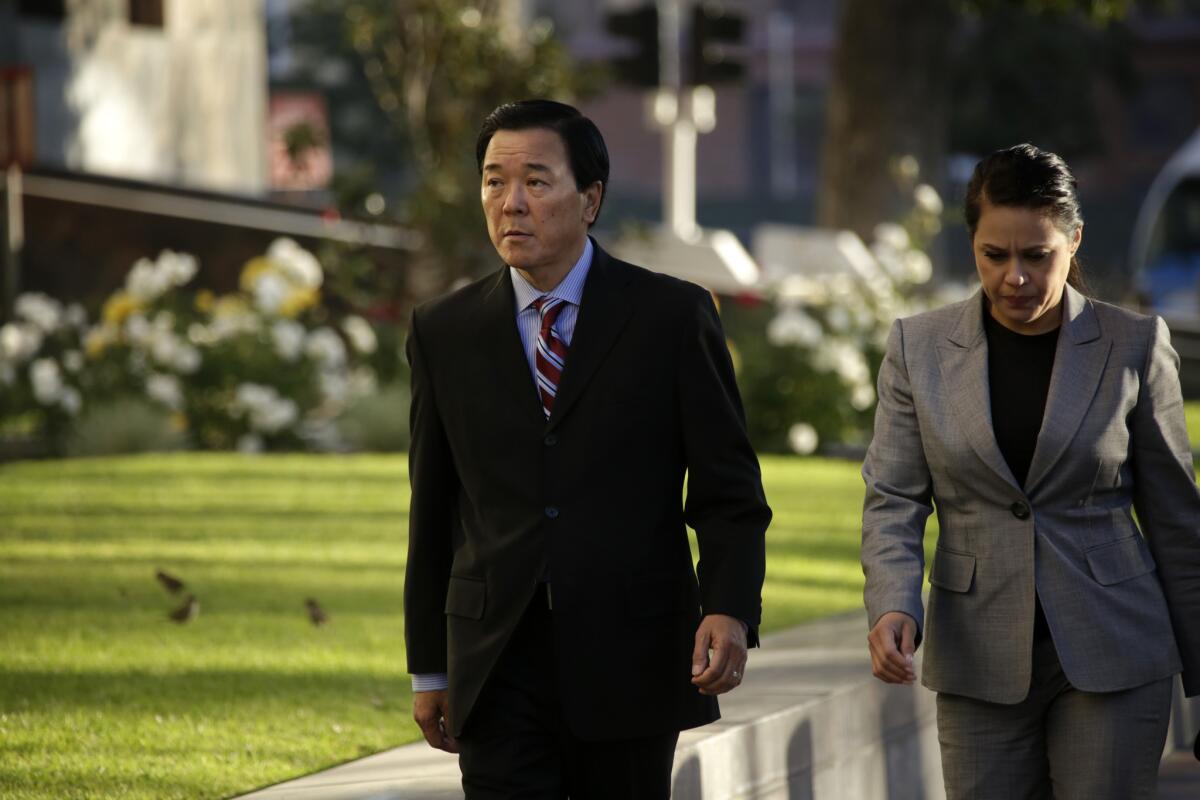As prosecution rests, former Undersheriff Paul Tanaka takes the stand

Paul Tanaka, former L.A. County undersheriff, took the stand Friday in his obstruction of justice and conspiracy case. So far, nine members of the Sheriff’s Department have been convicted or have pleaded guilty.
- Share via
Paul Tanaka, who once wielded great power within the ranks of the Los Angeles County Sheriff’s Department, took the witness stand Friday to defend himself against charges he interfered with an FBI investigation into jail abuses.
The former undersheriff, who served as the second in command to former L.A. County Sheriff Lee Baca before retiring amid scandal, is charged with conspiracy and obstruction of justice for the leading role he allegedly played in an elaborate scheme to thwart the FBI.
According to prosecutors, Tanaka orchestrated a group of collaborators who tried to intimidate the FBI agent leading the probe into widespread claims of extrajudicial jail beatings. Tanaka also allegedly concealed the whereabouts of an inmate when his role as an FBI informant was discovered, prosecutors said.
See the most-read stories this hour >>
Tanaka’s testimony was the opening gambit in his defense, coming after prosecutors for U.S. Atty. Eileen Decker rested their case, which featured a long procession of witnesses from within the Sheriff’s Department and FBI.
During more than two hours of questions by one of his lawyers, Tanaka denied the allegations against him and portrayed himself as a tough, but upright leader who was guided by a strict moral compass. Trying to minimize his role in the department’s response to the FBI investigation, Tanaka laid blame on Baca, who he said was consumed with anger over the FBI probe.
He recounted Baca’s frequent demands for updates on the perilous turf battle sheriff’s officials had picked with the FBI. “He would always ask, ‘What’s going on?’ And I couldn’t answer because I wasn’t” involved, Tanaka testified.
Presented with the chance to grill Tanaka, Assistant U.S. Atty. Brandon Fox wasted no time bearing down on the defendant during cross examination. His first question was about Tanaka’s reported membership in a notorious and violent clique inside the sheriff’s ranks.
Tanaka’s defense team quickly objected to the line of questioning and U.S. District Judge Percy Anderson called an end to the day’s proceedings, saying he would decide on how much leeway to grant Fox before trial resumes Monday morning.
The trial is likely the last in a series of high-profile prosecutions stemming from 2011, when sheriff’s officials discovered and objected angrily to a secret FBI inquiry into the jails. In all, nine members of the department have been convicted or have pleaded guilty.
Last month, Baca himself joined the group of felons when he admitted to lying to FBI agents and prosecutors during their investigation into beatings of inmates and visitors at the nation’s largest jail system. Under the terms of the deal he struck with prosecutors, Baca, who left office two years ago, will avoid being indicted on more serious charges and can be sentenced to no more than six months in prison. Anderson must still approve the agreement.
Choosing to testify brings considerable risk since Tanaka must now endure what is certain to be intense questioning by Fox. His decision to take the stand and forgo his constitutional rights against self-incrimination, indicated that Tanaka and his attorneys felt they needed Tanaka to try to persuade the jury after the government put on a compelling case.
Over a week of testimony, jurors heard from witnesses who told how Anthony Brown, a convicted felon who began working as an FBI informant while he was serving time in the county’s main jail facility, was hidden from agents after his cover was blown.
A records clerk, for example, testified how deputies pressured her to falsify entries in the agency’s database to show Brown had been released from custody when, in fact, he remained in a jail cell.
When the clerk refused, the deputies warned her that Tanaka had authorized the move, she told jurors.
See more of our top stories on Facebook >>
The episode, prosecutors contend, was part of a broader scheme in which the deputies repeatedly moved Brown among various jail facilities under fake names to conceal his whereabouts from federal authorities.
Tanaka, 57, is also accused of being part of the decision to dispatch two sergeants to the home of the FBI agent leading the jail inquiry. The pair confronted the agent outside hrt apartment building and threatened to arrest her for her role in a sting operation that involved smuggling a cellphone into Brown.
Fox played for jurors a recording of a phone call the agent’s supervisor made to one of the sergeants after the confrontation, demanding information about when the arrest would be made and what the charges would be.
“You’ll have to talk to the undersheriff,” the sergeant responded.
With his attorney walking him deliberately through the planning meetings, conversations, and emails that prosecutors used to incriminate him, Tanaka simply denied the things he was accused of saying and doing.
“Did you ever issue any orders that Anthony Brown should be hidden from the FBI?” Jerome Haig, one of his attorneys asked.
“No,” Tanaka replied.
Find me on Twitter: @joelrubin.
ALSO
Father accused of fatally shooting son because he was gay
Poor residents were promised Wi-Fi service. They didn’t get it
Cab driver who was kidnapped by O.C. jail escapees didn’t get a reward — so he plans to sue
More to Read
Sign up for Essential California
The most important California stories and recommendations in your inbox every morning.
You may occasionally receive promotional content from the Los Angeles Times.











